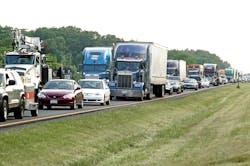New report identifies major highway choke points and their costs
A new report released today by the American Highway Users Alliance (AHUA) not only identifies some of the worst highway “bottlenecks” in the U.S. but also estimates the potential economic and safety benefits that could result if they were fixed.
Besides identifying and ranking the nation's 50 worst traffic bottlenecks, AHUA’s study – Unclogging America's Arteries 2015 – examined the top 30 choke points in detail and calculated what benefits would be gained over the next 20 years by fixing them. The group said such improvements would:
- Save $39 billion due to lost time;
- Save 830 million gallons of fuel;
- Reduce over 17 billion pounds of greenhouse gas emissions (carbon dioxide or CO2);
- Prevent 211,000 vehicle crashes.
"These findings are critically important,” noted Greg Cohen, AHUA’s president and CEO, in a statement.
“They mean that our nation will derive huge benefits from fixing the worst gridlock in our nation's highway system: benefits that go way beyond improving mobility for highway users," he said.
The group’s report noted that that the very worst bottleneck in the nation, as measured by hours of delay, is in Chicago, IL, though Los Angeles owns the next six out the top 10 highway “choke points.”
Bill Graves, chairman of the AHUA as well as president and CEO of the American Trucking Associations (ATA) noted that those same bottlenecks “cost our economy billions with the delays they cause moving our nation's freight. They are truckers' worst nightmares come true, but one that tens of thousands of our nation's freight haulers have to deal with daily.”
As for the bottlenecks themselves, the study's top 50 list includes trouble spots in the following Metropolitan Areas: 12 in Los Angeles, nine in and around New York City, three in Chicago, three near Washington D.C., three in Houston, three in Boston, three in Dallas, three in Miami, two in Atlanta, two in Philadelphia, and two in San Francisco/Oakland.
Austin TX broke into the top 30 list at number 10, with Norfolk, VA, and Tampa, FL coming in at 38th and 45th, respectively.
AHUA said its study relies on the same data utilized by the Federal Highway Administration (FHWA) to pinpoint the major choke points and is a follow-up to a report the Highway Users issued over 10 years ago.
The group added that bottlenecks were ranked based on backups in both directions over the entire day, not just one direction during rush hours.
The Los Angeles region had far more top bottlenecks than any other metropolitan area, claiming the second through seventh worst spots, as well as the 11th, 13th, 14th, 29th, 30th and 40th. L.A.'s worst highway “choke point” is the 405 between SR22 and the 605, AHUA noted, where the annual cost of delays exceed $190 million, wasting 1.8 million gallons of fuel with daily backups over four miles long.
Also breaking into the top 10 was New York City with the 8th and 9th worst bottleneck at the notorious Lincoln Tunnel and on I-95 from Manhattan across the Bronx. Metropolitan New York also served as home to the 18th, 19th, 21st, 31st, 33rd, 37th, and 42nd worst choke points in the U.S.
About the Author
Sean Kilcarr
Editor in Chief
Sean Kilcarr is a former longtime FleetOwner senior editor who wrote for the publication from 2000 to 2018. He served as editor-in-chief from 2017 to 2018.
